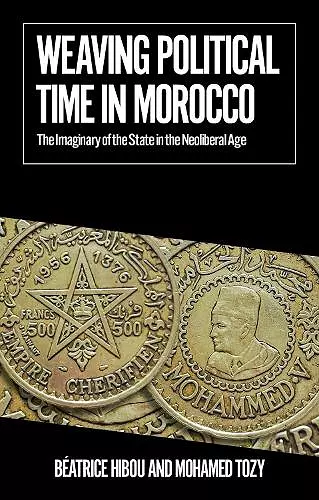Weaving Political Time in Morocco
The Imaginary of the State in the Neoliberal Age
Béatrice Hibou author Mohamed Tozy author Katharine Throssell translator
Format:Paperback
Publisher:C Hurst & Co Publishers Ltd
Published:20th Mar '25
Should be back in stock very soon

Analyses of state power in Morocco have always been mired in exoticism or exceptionalism. The Kingdom is said to be a prototype of political immobility; a country caught in the authoritarian and conservative grip of its monarch, known as the ‘Commander of the Faithful’; a state in need of democratisation, but also a bastion of moderate Islam.
Drawing on thirty years of fieldwork, interviews and extensive primary documentation, Béatrice Hibou and Mohamed Tozy reveal how demographic, political and cultural changes have transformed Morocco’s government and modes of domination, from its pre-colonial past to the present. Interrogating the ideas of ‘Empire’ and ‘Nation-state’ as particular forms of rule, they examine the legacy of the centuries-long Sharifian Empire, in relation to the contemporary neoliberal government. They show how imperial traditions and the modern state co-exist today, in an intricate tapestry of seemingly contradictory power relations, different understandings of legitimacy, and competing visions of authority, sovereignty and responsibility.
Drawing on the work of Max Weber and Michel Foucault, Weaving Political Time in Morocco is a comprehensive, comparative examination of the evolution and continuities of state power in this complex North African country.
‘An impressively well researched, empirically detailed and theoretically rich account of Moroccan governmental history. Rigorous and carefully argued, this is a most welcome addition to the debates and literature on politics and power in the MENA-region and beyond.’
-- Koenraad Bogaert, Associate Professor in the Faculty of Political and Social Sciences, Ghent University, and author of Globalized Authoritarianism: Megaprojects, Slums, and Class Relations in Urban Morocco'A most original and inspiring book. Through their notion of “weaving time”, Hibou and Tozy surpass the binaries haunting modern Morocco studies. Empire and Nation-state become two registers in constant articulation, producing new expressions and changing combinations. An engaging read in which stories are not only illustrations, but move the analysis forward.'
-- Peter Geschiere, Emeritus Professor for the Anthropology of Africa, University of Amsterdam, and author of The Perils of Belonging: Autochthony, Citizenship, and Exclusion in Africa and Europe‘A fascinating read. The argument is original, and the authors do a fantastic job of engaging with Moroccan and French sources. A very impressive book.’
-- David Crawford, Professor and Chair, Department of Sociology and Anthropology, Fairfield University, and co-editor of Encountering Morocco: Fieldwork and Cultural Understanding‘How does this brilliant ethnographic study account for the longevity of Morocco’s monarchy? Whether in the pre-colonial Makhzen Sultanate or the post-independent Moroccan state that emerged from French colonialism in 1956, they find institutional violence and state indifference through a rich array of case studies: the state-owned Tangier Exportation Free Zone, the phosphate mining company monopoly, the role of the muqaddam as local-level surveillance, and so much more.’
-- Susan Slyomovics, Distinguished Professor of Anthropology, University of California Los Angeles, and author of The Performance of Human Rights in Morocco‘With Weaving Political Time in Morocco, the country enters the mainstream of global historical sociology and social thought. Conceptually innovative, this book offers fresh insight into Morocco and a model for understanding politics elsewhere.’
-- Professor Dale F. Eickelman, author of Knowledge and Power in Morocco‘A necessary and significant reflection on how contemporary and historical narratives and practices of political domination and governance are interwoven, disrupting any linear understanding of change in Morocco. Instead, temporality is multi-faceted, bringing together notions of modern and much older forms of identity and power that both perpetuate and undermine political authority.’
-- Shana Cohen, Affiliated Lecturer in the Department of Sociology, University of Cambridge, and author of Transforming Social Action into Social ChangeISBN: 9781805262794
Dimensions: unknown
Weight: unknown
424 pages